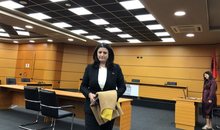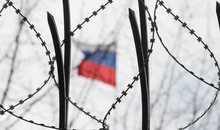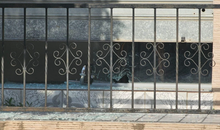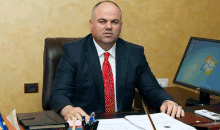
 Flash News
Flash News
Video/ Revolt in Corfu prison, Albanians and Georgians set fire to cells
Accident at "Shkalla e Tujanit" in Tirana, a car overturns after the collision
KPA dismisses Tirana judge Ardiana Bera from office
Don't lose face/ After Rama's 'threat', SP candidates withdraw request from CEC
VIDEO/ The assassination in Durrës, the moment of the murder of 29-year-old Ermir Dedja

He learned the news that his mother had been killed from the online media.
"I saw the news on the portals and I couldn't believe it," Alaudin Haradini told Radio Free Europe (REL) on March 25, a day after his mother was killed in the Vushtrri village of Stanoc.
This is because, shortly after the murder, various media had published the identity of the murdered 42-year-old woman.
Even the brother of Liridona Ademaj, the woman who was killed in November 2023 on a road in the village of Brnica in Prishtina, says that there have been cases when family members have been worried about the cause of reports from some media.
"There have been several investigative leads that have been set up by the media which could have aroused some expectations or even momentary concern," Leonard Ademaj tells REL, but emphasizing that, in general, he is satisfied with the reporting made on the case of his sister's murder.
But this month, after a case that was reported in the media as a slaughter and suicide, the Kosovo Print Media Council (KMSHK) called on the media to be "careful, empathy and professionalism" when reporting on tragic cases.
The Association of Journalists of Kosovo (AGK) also joined the call, demanding that the identity and privacy of those involved in the case be preserved.
But, in addition to the violation of privacy, Bind Skeja, executive director of the Center for Information and Social Improvement, is also concerned about the general content of texts about tragic cases, such as murders and suicides.
"Four or five news stories are published with little information about the case, [with titles such as] 'here is an article that has left him...', 'here's what the family members say'. I have seen that the media have also gone to the funeral. It doesn't take a lot of brains to know that this is a mistake," Skeja tells REL.
What effect does this news have?
Such news only has a negative effect, according to Skeja, who runs the volunteer call center, Lifeline, offering help to people who have suicidal thoughts, or who suffer from depression or anxiety.
He says the breach of privacy inadvertently makes survivors and their relatives familiar faces to the public.
"If tomorrow I go to an employer, the employer will Google my name, and the news comes out 'This is XY's mother who committed suicide,' and [the employer] creates perceptions that may be peaceful, but that have a direct impact on the lives of these people," says Skeja.
He believes that what makes the situation in Kosovo even more problematic is the way "the topic of suicide is still quite stigmatised".
According to Skaga, an even more problematic effect is "what this news does to people who have suicidal thoughts".
"The sensationalism of cases and the publication of excessive, unnecessary details can give the impression to people who already have suicidal thoughts, that there is no escape," he says.
"Because they constantly see people in the news who end up committing suicide and this can push them, who have already thought about committing suicide, to speed up the plan or to create new ideas on how to do it," Skeja adds.
Një studim i publikuar në vitin 2020 nga hulumtues ndërkombëtarë të universiteteteve dhe institucioneve shëndetësore të ndryshme kishte gjetur se rreziku për vetëvrasje rritej për 13 për qind në periudhat kur mediat raportonin për vdekje të personave të famshëm nga vetëvrasjet.
Ai studim gjeti edhe që në rastet kur publikohet edhe mënyra se si ishte kryer vetëvrasja, kishte rritje për 30 per qind të rasteve të vdekjeve nga po ajo metodë.
Një efekt i ngjashëm është vërejtur edhe në Kosovë.
“Kur fliten këto tema shumë në publik, ka më shumë thirrje drejt Linjës së Jetës”, thotë Skeja.
Por, ai do të donte më shumë thirrje, pasi që vetëm ashtu mund “të baraspeshohet dëmi që bëhet prej raportimeve”. Problemi është, sipas tij, që mediat zakonisht nuk udhëzojnë lexuesit se ku mund të kërkojnë ndihmë.
“Mediat flasin për vetëvrasje, por nuk u tregojnë njerëzve se ku të kërkojnë ndihmë. Njerëzit i lexojnë këto lajme dhe nuk e dinë se ekziston Linja e Jetës”, thotë Skeja.
Çfarë s’duhet raportuar?
Fernanda Camarena, ligjëruese e etikës në institutin për media Poynter, me seli në Florida të Shteteve të Bashkuara të Amerikës, thotë se parim kyç për gazetarët e redaktorët do të duhej të ishte “minimizimi i dëmit”.
"As journalists, we must remember that our priority is the audience and the fulfillment of our journalistic mission," she tells Radio Free Europe.
In order not to deepen the trauma, prejudice and incitement of other similar cases, Camarena recalls the principles of large media organizations, such as the Associated Press agency, not to report on suicides, except when "it is a matter of a public figure, interferes with public life or represents a great public interest".
"And, when such news needs to be reported, they have guidelines to follow," says Camarena, who previously served as a manager on NBC News' U.S. Standards and Practices team.
And what guidelines are involved?
Camarena emphasizes some key ones, such as: not to be given the main media space, to avoid glorifying or romanticizing suicide, not to describe attempts as "failed" or "unsuccessful", under no circumstances to publish photos or videos from the scene, such as images of the deceased, notes left or the exact location.
She also suggests including, where possible, stories of people who have continued to live happily ever after suicide attempts.
"Writing articles about treatment and recovery shows the audience that help exists," says Camarena.
Camarena describes reporting on such tragic cases - i.e. murders and suicides - as "a test of the core values of the media organization".
"Statistics should not dictate editorial judgment, and newsrooms should define success as more than just the number of clicks. Do we serve our audience and their needs? Did we serve the public good?", she concludes.
And Skeja estimates that many media outlets in Kosovo are failing precisely at this point.
"The only reason this [unethical reporting] happens is purely capitalist. This news generates clicks, because people have a morbid curiosity to know what is happening," says Skeja.
Kosovo Police's daily reports are often news sources on cases of violence.
According to Police data, from January to April of this year, six cases of murder occurred.
There is no data on the number of suicides, while 890 cases of domestic violence have been reported./REL
Latest news



Torrential rainfall hits southeastern France, 3 confirmed victims
2025-05-20 20:49:14

Shehaj: Our votes will never unite with Edi Rama
2025-05-20 20:24:31
The ship "Butrinti" rescues 13 migrants in the Aegean Sea, including 2 children
2025-05-20 20:01:12
Video/ Revolt in Corfu prison, Albanians and Georgians set fire to cells
2025-05-20 19:51:04
Biden diagnosed with cancer, questions about his health in the White House
2025-05-20 19:37:01



How SP candidates withdrew from vote complaints after Rama's message
2025-05-20 18:34:12
Trump-Putin conversation/ Analysis: Who won in the two-hour call?
2025-05-20 18:15:00
Suspicions of electoral crimes, SPAK checks the municipality of Klos
2025-05-20 18:02:48
Vucic message to the Serbian coach: Go to Tirana and win against Albania
2025-05-20 17:50:48
Këlliçi: The diaspora vote is a massacre, the violations are flagrant
2025-05-20 17:39:37
Accused of drug trafficking in Italy, the Supreme Court acquits Kreshnik Farruku
2025-05-20 17:20:53

Venezuelan President: Ecuador's Albanian Mafia seeks to sabotage our elections
2025-05-20 17:01:14
Accident at "Shkalla e Tujanit" in Tirana, a car overturns after the collision
2025-05-20 16:51:18
Diaspora vote, Source: Process more symbolic than with real impact
2025-05-20 16:41:12
Why Careful Reporting on Tragic Cases Is Important
2025-05-20 16:17:12
KPA dismisses Tirana judge Ardiana Bera from office
2025-05-20 16:13:30
Even young people with hypertension, 35% of 18-year-olds with blood pressure
2025-05-20 16:01:07


Enigma/ How did the SP grow more than in the previous elections this year?
2025-05-20 15:12:50
Threat against President Osmani, KMDLNJ: Risk to security and democracy
2025-05-20 15:01:56

Hungary's parliament approves withdrawal from the International Criminal Court
2025-05-20 14:50:00
Defamation lawsuit against Albana Vokshi, hearing postponed at the GJKKO
2025-05-20 14:36:20
Names/Who are the 140 MPs who will sit in the Assembly?
2025-05-20 14:21:57
Why don't young people want to get married anymore?
2025-05-20 14:15:27
EU approves new sanctions against Russia
2025-05-20 13:49:54
Flax seeds, positive and negative effects of their consumption
2025-05-20 13:45:54

Pope Leo XIV's house goes up for auction for $250,000
2025-05-20 13:23:49

Don't lose face/ After Rama's 'threat', SP candidates withdraw request from CEC
2025-05-20 13:02:09
Berisha warns Rama: You will not stay in power with this farce
2025-05-20 12:55:00



RTSH's official website hacked, fake news about Kosovo appears
2025-05-20 12:10:17

Accident in Korça, motorcycle collides with car, 45-year-old injured
2025-05-20 11:44:48


Germany/ 46-year-old Albanian injures three people, including an 11-year-old
2025-05-20 11:12:01
What does the agreement between Britain and the EU contain?
2025-05-20 11:01:38


Kosovo bans chicken imports from Brazil
2025-05-20 10:33:45
Makinën plot me d*ogë, vihen në pranga dy persona në aksin “Mamurras-Kashar”
2025-05-20 10:23:33
How does speaking multiple languages change the brain?
2025-05-20 10:15:05
Photo/ This is the 29-year-old who was executed in Durrës
2025-05-20 10:00:39
Foreign exchange/ How much foreign currencies are bought and sold today
2025-05-20 09:51:04




Discover the main signs that indicate your body lacks vitamin D
2025-05-20 09:06:39

Horoscope, what do the stars have in store for you today?
2025-05-20 08:50:06

He was executed by masked men, who is the 29-year-old who was killed in Durrës?
2025-05-20 08:28:21
Assassinations in Durres, 29-year-old executed
2025-05-20 08:14:59
Clear skies and light clouds, this is the weather forecast for Tuesday
2025-05-20 08:05:40
Posta e mëngjesit/ Me 2 rreshta: Çfarë pati rëndësi dje në Shqipëri
2025-05-20 07:50:55
"We broke a myth", Shabani: The Shehaj-Lapaj debate also harmed us
2025-05-19 22:59:18




Shkullaku: With the vote of the diaspora, a slaughterhouse has been created
2025-05-19 21:46:19
CEC orders recount in 2 polling centers in Elbasan and Durrës
2025-05-19 21:33:47

250 euros a night for virtual clients, online prostitution discovered
2025-05-19 21:17:10
Yrshek, 15-year-old hits and kills an elderly man
2025-05-19 21:07:05

Adoption in Albania: The system that "holds" abandoned children hostage
2025-05-19 20:52:27

Counting for preferential vote in Tirana ends, Xhaçka receives mandate
2025-05-19 20:23:22
Kosovo President Vjosa Osmani receives death threat
2025-05-19 19:47:49



Safet Gjici's release, lawyer: Today the true face of justice was seen
2025-05-19 19:02:46

King Charles writes to Biden after being diagnosed with cancer
2025-05-19 18:34:07

Ceasefire in Ukraine, Trump holds phone conversation with Putin
2025-05-19 18:24:47
56-year-old Albanian man in Italy dies at work after being hit by truck
2025-05-19 17:52:50


Migrant boat sinks off French coast, 1 dead, more than 60 rescued
2025-05-19 16:58:47
January-March, the number of births fell by 14%
2025-05-19 16:48:50

Nothing new from Edi Rama's politically subjugated justice
2025-05-19 16:33:53
